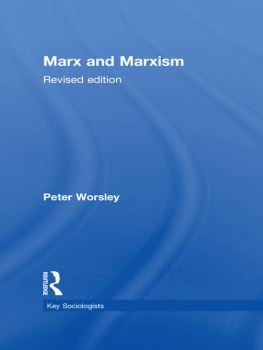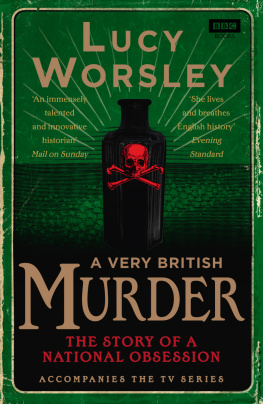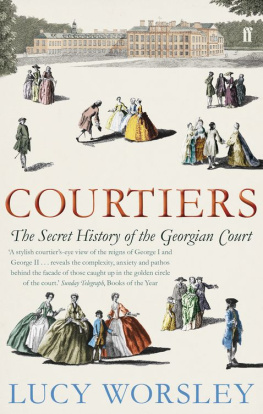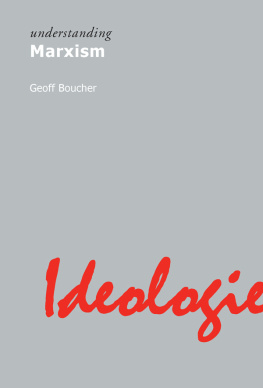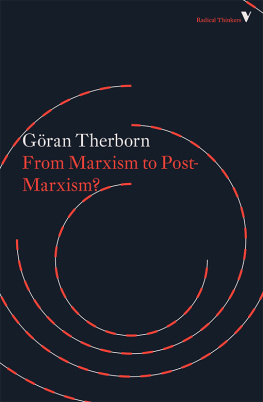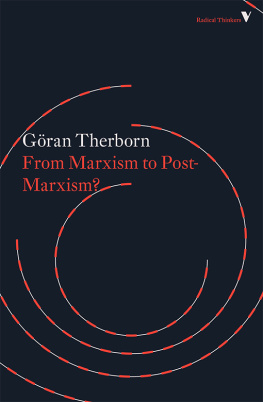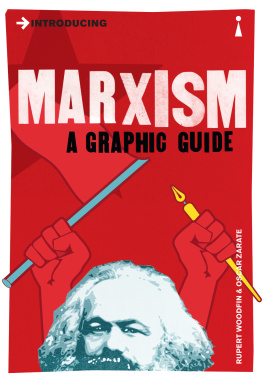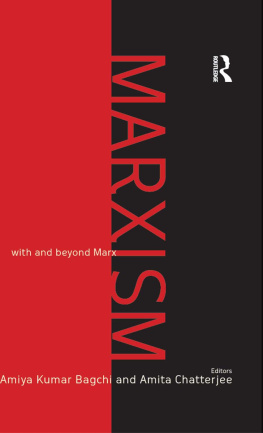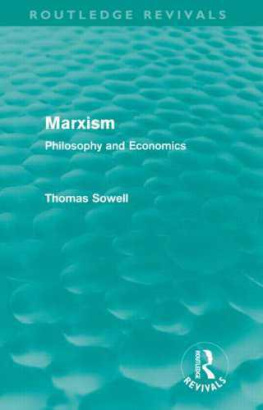Preface and Acknowledgments
My thanks are due to Peter Hamilton, Hamza Alavi, and Teodor Shanin, who read the first draft and made valuable comments, and to Linda Ollerenshaw, Jeanne Ashton, Janice Hammond and Hilary Thorber, who typed the manuscript with great efficiency. Sami Zubaida read the second edition for me.
Thanks are due to Lawrence & Wishart Ltd. for permission to use quotations from Marx and Engels Selected Works , their Selected Correspondence , and from Marxs The Holy Family ; to the World Publishing Company, New York, for a quotation from E. J. Hobsbawms The Age of Revolution 17971848 ; Eyre Methuen Ltd. for the translation by Steve Gooch of the poem In Praise of Communism from Bertholt Brechts The Mother; and to Routledge & Kegan Paul Ltd. for an extract from Herbert Blumers essay Society and Symbolic Interaction, republished in Arnold M. Rose (ed.), Human Behaviour and Social Process .
Suggestions for Further Reading
It is best to begin by reading the original writings of Marx and Engels before turning to later Marxists and to commentaries. When they finally appear, the collected writings of Marx and Engels will run to more than fifty volumes. The most important are probably these:
Marx: Economic and Political Manuscripts of 1844 .
Marx: Theses on Feuerbach (1845).
Engels: The Condition of the Working Class in England in 1844 (1845).
Marx: Wage Labour and Capital (1847).
Marx and Engels: The Manifesto of the Communist Party (1848).
Marx: The Eighteenth Brumaire of Louis Bonaparte (1852).
Marx: The Preface to A Contribution to the Critique of Political Economy (1859).
Marx: Wages, Price and Profit (1865).
Marx: The Civil War in France (1871).
Marx: Critique of the Gotha Programme (1875).
Engels: Anti-Dhring : Herr Eugen Dhrings Revolution In Science (1878).
All the above are contained in Marx and Engels, Selected Works , Lawrence & Wishart, London. Marx and Engels, Selected Correspondence , Foreign Language Publishing House, Moscow, is a vital companion volume, together with Marx and Engels On Britain (all three are inexpensive editions), and in addition:
Marx: Class Struggles in France (18481850).
Marxs Grundrisse (18571858), a selection by David McLellan, Paladin Books, 1973.
Marx: Capital , Volume 1.
The standard English biography of Max is David McLellans Karl Marx: his Life and Thought (Macmillan, 1973). The first volume of Yvonne Kapps authoritative study of Eleanor Marx (Lawrence & Wishart, 1972), provides a fascinating account of the domestic life of Marx and Engels. More recently, Francis Wheens superb Karl Marx (Third Estate, 1999), combines the strengths of both of these works. Superbly researched, it is also, being written by a journalist, supremely readable. It even includes the only surviving record of a chess-game Marx played. (He won.)
Michael Evans Karl Marx (Allen & Unwin, 1975) is a sound, lucid and succinct analysis of Marxs political thought. Derek Sayers Marxs Method: ideology, science and critique in Capital (Harvester, 1979) provides a clear and accurate distillation of Marxs economic ideas. Shlomo Avineris The Social and Political Thought of Karl Marx (Cambridge University Press, 1970) emphasizes the influence of German idealist philosophy on Marxs thinking. A classic of scholarship which is also eminently readable is Edmund Wilsons 1940 study of the forerunners of Marx and Engels and of Lenin and Trotsky, To The Finland Station (Doubleday Anchor Book).
Marxism after Marx is best represented by practitioners of revolution. The two volumes of Lenins Selected Works (Foreign Languages Publishing House, Moscow) contain most of his key writings, notably What is to be Done?, Two Tactics of Social Democracy, Imperialism, What the Friends of the People Are, One Step Forward, Two Steps Back, The State and Revolution, and Left-wing Communism, an Infantile Disorder. Trotskys compelling History of the Russian Revolution (one volume edition, Doubleday Anchor Books) and The Revolution Betrayed (originally 1937, many editions), provide a dynamic contrast to the now virtually unobtainable Short Course on the History of the Communist Party (Bolsheviks), the Bible of international communism in the Stalin era, once printed in hundreds of millions of copies and in dozens of languages. Mao Tse-Tung Unrehearsed: talks and letters 195671 , edited by Stuart Schram (Penguin, 1974) contains much off-the-record material which can be read alongside the official Selected Works , particularly Volume 1, which contains his essay On the Analysis of Classes in Chinese Society and the important and fascinating Report on the Peasant Situation in Hunan ( Selected Works , Vol. 1, 1954, Peking). In addition, his short essay On Contradiction in Essential Works of Chinese Communism , edited by Winberg Chai (Bantam, New York, 1969) should be read and compared with the talk On the Ten Great Relationships in the Schram volume. Antonio Gramscis The Modern Prince and Other Writings (Lawrence & Wishart, 1957) contains the most important passages from Gramscis writings.
For a valuable survey of Marxism closer to home, see Perry Andersons Considerations on Western Marxism (New Left Books, London 1976). A major theoretical school strongly influenced by Marxism in interwar Europe, the Frankfurt School, is portrayed in Martin Jays The Dialectical Imagination (Heinemann, 1973). Finally, Marxist scholarship at its best is represented by E. J. Hobsbawms series of books (many editions): The Age of Revolution 17981848; The Age of Capital 18481875; Industry and Empire ; and The Age of Extremes: the short twentieth century ; by Christopher Hills Reformation to Industrial Revolution (Penguin, Harmondsworth, 1969); by E.P.Thomsons The Making of the English Working Class (Penguin); and by Perry Andersons Passages from Antiquity to Feudalism and Lineages of the Absolutist State (New Left Books, London, 1974).
Introduction
De Omnibus Dubitandum (We ought to question everything) Karl Marxs favourite motto.
Karl Marx has probably affected the course of twentieth-century history more than any other single thinker. Because of this, his ideas have generated a vast output of writings, ranging from texts written by revolutionaries aimed at telling people how to do revolution how to carry on Marxs work of demolishing capitalism and creating a new socialist society to the many hundreds of volumes dedicated to proving that Marx was wrong about practically everything. As I write, in the last few months in Britain alone, for instance, Marxs theory of class and his analysis of the transition from feudalism to capitalism have been declared to be seriously in error.
Most of these attacks are written by academics. Politicians generally combat Marxism in other ways than by writing books. The growing body of literature produced by writers who identify politically with Marxism is also principally produced by academics. There is a third category: Marxologists, rather than Marxists: people who study Marx as they would any other thinker, whether as a case-study in the history of ideas, at times even, in an antiquarian way, without much concern for the social impact of his ideas and often without necessarily identifying themselves with Marx politically. Many Marxologists are even enemies of Marxism; for others, he is just a minor, even quaint, Victorian figure whose work mainly consisted of errors.
If this were so, it would be difficult to explain why his ideas still seem to millions of people to make very good sense of the world they live in, and show them, in Lenins phrase, what is to be done to improve it. Yet in his own lifetime, Marxs ideas had little impact. Only after his death did the Western explicitly Marxist mass party come into existence, in Germany. Since then, in the advanced capitalist countries, Italy and France apart, Marxism has still not gripped the masses much. Where it has taken root has been in impoverished agrarian countries dominated by the industrialized powers. The Chinese Communist Party, for instance, was established in 1921, only a year after the Communist Manifesto was translated into Chinese, and had 57 members. Within five years, it was leading a general strike in Canton, and less than thirty years later, was in power in the country with a quarter of the worlds population. The British Communist Party, on the other hand, founded in 1921, numbers around 25,000 members, and the Communist Party in the USA, according to one black joke, probably had a majority of FBI members in the McCarthy era.

